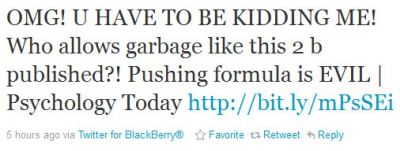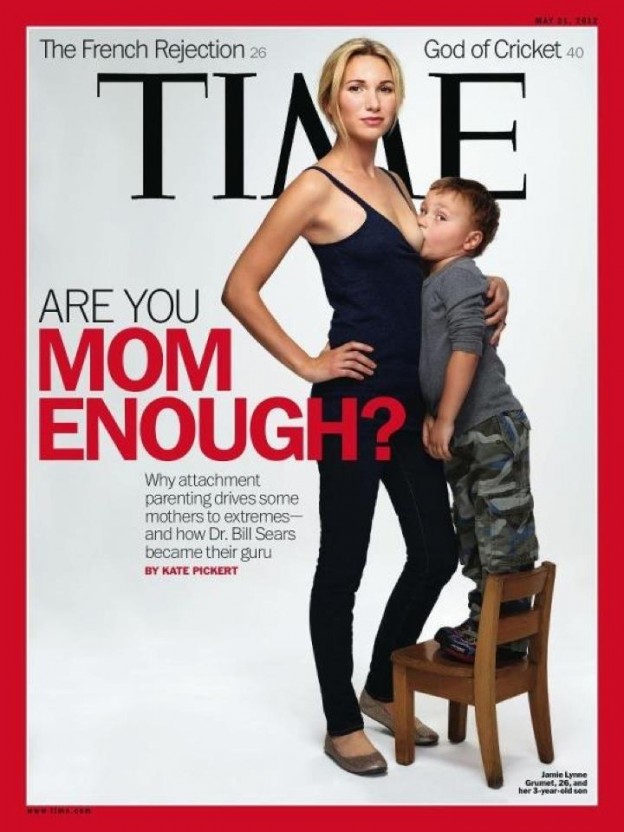 Yesterday afternoon, the tweet you see to your left was sent out by a friend of mine. Of course I clicked. Then I waited for my phone to fully load the page. Once it loaded, I scrolled through the article. With each new point, my rage increased. Not until the end of the article did the author even begin to show a shred of compassion for mothers who rely upon formula in medically necessary situations. Even then her compassion was thin and failed to mention mothers struggling with postpartum depression. A few back and forths about the article then Karen Kleiman posted a rebuttal. So did Ivy Shih Leung over at Ivy’s PPD Blog.
Yesterday afternoon, the tweet you see to your left was sent out by a friend of mine. Of course I clicked. Then I waited for my phone to fully load the page. Once it loaded, I scrolled through the article. With each new point, my rage increased. Not until the end of the article did the author even begin to show a shred of compassion for mothers who rely upon formula in medically necessary situations. Even then her compassion was thin and failed to mention mothers struggling with postpartum depression. A few back and forths about the article then Karen Kleiman posted a rebuttal. So did Ivy Shih Leung over at Ivy’s PPD Blog.
And now? I give you mine.
My mother nursed my brothers and I for 18 months each. Or that’s what I’ve been told. I’m sticking to it. I grew up thinking breastfeeding was normal. I grew up used to seeing my mother nurse my brothers. It was how they were fed. It wasn’t weird. Or strange. I wasn’t scarred by the experience. I was six years old when my youngest brother stopped nursing. Closer to seven, actually.
When pregnant with my first child, I knew I would nurse. Because breastfeeding is how babies eat. She, however, had other plans that first day. Not interested in the boob. Didn’t eat at all in the hospital. We were sent home with barely any instruction but by god, they sent a bag with free formula samples. Which I used when she was screaming at 10pm that night and I couldn’t get her to latch. We used three of those samples the first night. I woke up the following morning determined to make breastfeeding work. For us, it did. She latched and we didn’t look back for 16 months when she finally weaned. Breastfeeding was the ONLY thing I did right with her in those early days. I failed at everything else. I couldn’t handle her screaming. She nursed for an hour every two hours so I stayed on the couch. No outside support. I was modest, didn’t want to nurse in public, etc. Quick trips in between nursings became the norm for us. At three months postpartum, my doctor asked me how important breastfeeding was to me as my daughter screamed in her carseat next to me. Seriously? I left his office even more defeated than when I walked in. I left with no help. Clearly I had to do this on my own. She thrived, I broke down.
My breakdown continued into my second pregnancy, leading to an early delivery. Our second daughter was born with a cleft palate. Once again, I expected to give birth, nurse, and go home. I had higher hopes for starting nursing this time. Instead, later that evening, I was trained in how to use a Medela Symphony and clutched cold hard horns to my poor not yet full breasts. No one explained colostrum’s small production to me and the nurse even laughed at what I got that first try. Again, I was defeated. My biggest moment of defeat? When the nurse asked me what kind of formula I wanted our daughter to have.
“But, but.. I’m going to nurse her. She’s getting breastmilk.” I stammered.
“Honey, until your milk comes in completely, she needs to eat. What kind of formula? We have Enfamil or Similac.” the nurse stated.
“Enfamil.” I sighed and cried when she left.
And that was just the first day.
Let’s visit the day I was in the pumping room at the NICU and my daughter’s nurse started a feed with FORMULA just minutes before I exited with well over 8 ounces of fresh Mama milk. I made her stop the feed, dump the formula, and start a new one with my milk. Oh hell yes I did. Or what about the day of her G-tube and ear tube surgery when the nurses spilled 5 oz of her milk as they tried to get the Kangaroo pump to work? I was not nice.
At the same time though, I had to be okay with my daughter getting formula in those early days. Yes, I thought formula was evil. But when I couldn’t be there or have enough stored breastmilk at the NICU, if my daughter didn’t receive formula, she would have DIED. We had a toddler at home. The NICU was over an hour away. I couldn’t be there 24/7. So formula had to be okay. It wasn’t evil. It wasn’t non-nutritious. It was saving my daughter’s life. I needed to not feel guilty about what my daughter received. I needed to not think about how it was changing her gut flora. I needed to not be judged because damn it, I was trying as hard as I could but the pump only removes so much milk. I pumped around the clock – every three hours except for a luxurious 5 hour stretch in the wee hours of the morning when I let myself SLEEP. Sure, I could have stayed awake around the clock and made more to avoid the evil formula but again, I had a toddler. One needs sleep when attempting to care for a toddler. Or they win. Everything. And that, people, can get ugly fast.
I pumped exclusively for our second daughter for seven long months. During those seven months, I was hospitalized in an Acute Flight risk Mixed-Gender ward. I pumped every three hours there too. Pumping fed into my OCD. Clean, sanitize, run the kangaroo pump, pump, repeat. Every three hours. On top of caring for a toddler. On top of a husband working 70+ hours in the restaurant industry. On top of two dogs who ALWAYS waited to need to go outside until right after my let down whilst pumping and usually had an accident in the house. I made peace with a lot of things – lowered my standards for a lot of stuff. Because my daughter needed my breastmilk. I threw myself down the rabbit hole and wallowed there. I resented her. I hated her for what I had to do.
At seven months, I stopped. For my sanity, for my relationship with my family, for my daughter. We weren’t bonding. I was going crazy. When it’s a question of my sanity vs. breastmilk? My sanity will ALWAYS win. I cried when I bought formula. Expected to be judged and would have had a serious conversation with the person judging me. Possibly would have offered to invite them to my home to see just what it was I dealt with on a daily basis.
As I stated in Don’t Judge me, the manner in which baby is fed doesn’t matter. As long as everyone is thriving, that’s all that matters. Yes, we should be educated. But education does not have to come in a harsh form as it does in the “Pushing Formula is EVIL” article. State the facts. Be honest. Forthright. Respectful. Don’t make me feel guilty for my choices. If you have to preface an article with the following:
“NOTE TO MOMS: Don’t read this if you are feeling vulnerable, guilty or overstressed. NOTE TO ALL: I’m not a therapist but a researcher in child development.”
Chances are you shouldn’t be writing it. I preface things with “vulnerable” here. But never with guilty or overstressed. And based on the article, it’s clear the author isn’t a therapist. If she were a therapist, she would have been far more compassionate and understanding. If she had read recent research stating “Postpartum Depression and difficulty Breastfeeding often go hand in hand” she may have been more compassionate.
Depressed moms may use formula more often than other moms. Breastfeeding is tough for us. We struggle with touch. We struggle with throwing ourselves under the bus because quite frankly, we already feel run over by the damn bus.
Motherhood is about making the right choice for our family. Not making the right choice for someone else’s family. Not about judging others for their decisions. Not about filling people’s heads with unresearched facts in a demeaning manner.
For the record? My daughter is extremely bright. She tested almost off the charts in verbal comprehension at four. So did her sister.
When their brother was born, he nursed like a champ. But then I had emotional crisis at 3 months. My medication combined with my stress killed my supply. He was diagnosed as failure to thrive at six months having gained only four pounds since birth. The pediatrician suggested I pump. I knew where that road led. I closed the milk factory and he switched to formula in just two days. He gained weight, I was less stressed, and we thrived.
Formula worked for my family. It wasn’t evil. No one pushed it on us. I made educated decisions to use it. It saved my second daughter’s life. It saved my son’s life. It saved MY life. The author states that if one cannot breastfeed, a wet-nurse or milk from a milk bank is an acceptable substitute. I agree. But at the time, I couldn’t even get my insurance company to pay for what I felt was a “medically necessary” hospital grade pump. How on EARTH would I get coverage for milk-bank breastmilk?
Don’t ever tell me Formula is evil. It saves lives. The end.
My breasts, my sanity, MY CHOICE.
BOOM.
 When Jamie Grumet was tapped for an interview and photo-shoot for the most recent issue of TIME magazine, her goal was not to raise our hackles. Her goal, according to a Q&A at Time was: “There seems to be a war going on between conventional parenting and attachment parenting, and that’s what I want to avoid. I want everyone to be encouraging. We’re not on opposing teams. We all need to be encouraging to each other, and I don’t think we’re doing a very good job at that.” Read more: http://healthland.time.com/2012/05/10/q-a-with-jamie-lynne-grumet/#ixzz1uUnnAmrE
When Jamie Grumet was tapped for an interview and photo-shoot for the most recent issue of TIME magazine, her goal was not to raise our hackles. Her goal, according to a Q&A at Time was: “There seems to be a war going on between conventional parenting and attachment parenting, and that’s what I want to avoid. I want everyone to be encouraging. We’re not on opposing teams. We all need to be encouraging to each other, and I don’t think we’re doing a very good job at that.” Read more: http://healthland.time.com/2012/05/10/q-a-with-jamie-lynne-grumet/#ixzz1uUnnAmrE




